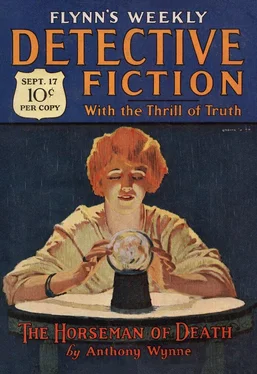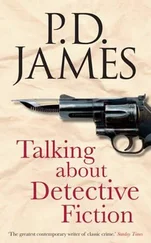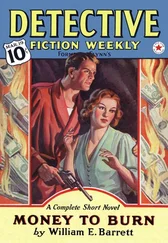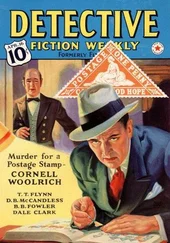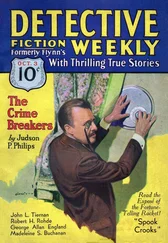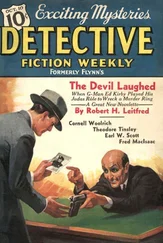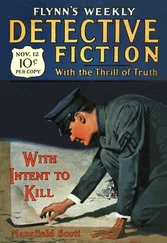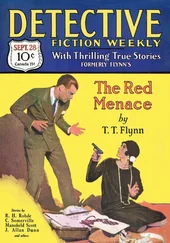Valentine - Flynn’s Weekly Detective Fiction. Vol. 27, No. 1, September 17, 1927
Здесь есть возможность читать онлайн «Valentine - Flynn’s Weekly Detective Fiction. Vol. 27, No. 1, September 17, 1927» весь текст электронной книги совершенно бесплатно (целиком полную версию без сокращений). В некоторых случаях можно слушать аудио, скачать через торрент в формате fb2 и присутствует краткое содержание. Город: New York, Год выпуска: 1927, Издательство: The Red Star News Company, Жанр: Детектив, на английском языке. Описание произведения, (предисловие) а так же отзывы посетителей доступны на портале библиотеки ЛибКат.
- Название:Flynn’s Weekly Detective Fiction. Vol. 27, No. 1, September 17, 1927
- Автор:
- Издательство:The Red Star News Company
- Жанр:
- Год:1927
- Город:New York
- ISBN:нет данных
- Рейтинг книги:5 / 5. Голосов: 1
-
Избранное:Добавить в избранное
- Отзывы:
-
Ваша оценка:
- 100
- 1
- 2
- 3
- 4
- 5
Flynn’s Weekly Detective Fiction. Vol. 27, No. 1, September 17, 1927: краткое содержание, описание и аннотация
Предлагаем к чтению аннотацию, описание, краткое содержание или предисловие (зависит от того, что написал сам автор книги «Flynn’s Weekly Detective Fiction. Vol. 27, No. 1, September 17, 1927»). Если вы не нашли необходимую информацию о книге — напишите в комментариях, мы постараемся отыскать её.
Flynn’s Weekly Detective Fiction. Vol. 27, No. 1, September 17, 1927 — читать онлайн бесплатно полную книгу (весь текст) целиком
Ниже представлен текст книги, разбитый по страницам. Система сохранения места последней прочитанной страницы, позволяет с удобством читать онлайн бесплатно книгу «Flynn’s Weekly Detective Fiction. Vol. 27, No. 1, September 17, 1927», без необходимости каждый раз заново искать на чём Вы остановились. Поставьте закладку, и сможете в любой момент перейти на страницу, на которой закончили чтение.
Интервал:
Закладка:
As usual, in matters of this kind, Gresham’s judgment was vindicated. It was exactly ten days later that Barrow was summoned to the office of the chief of claims.
“Seen the afternoon paper yet?” the chief asked.
Barrow had not. Gresham handed it to him, pointing to the glaring headline that ran across the top of the entire first page:
“No killing?” Barrow asked, frankly surprised.
“No,” Gresham answered, “not this time.”
Barrow read the story with interest.
The Parberrys, wealthy New Yorkers, had returned from dinner to their suite in the Bensonia, exclusive Fifth Avenue hotel, to find their butler and maid securely trussed up and gagged. The suite, had been ransacked, but nothing but jewels had been taken.
The story told by the two servants was related by each alone and found to check up perfectly. They had been seated in the butler’s pantry talking when the door leading into the servants’ hall opened without warning and both found themselves looking into the muzzle of an automatic. The man who held the pistol was completely masked.
“Not a word,” he had warned them, “or I’ll blow you to hell and back. I’ve nothing to live for anyway.”
Then he compelled the butler to bind and gag the maid, following which he similarly rendered the man helpless.
Then, at leisure, he looted the suite of all its gems. He had departed the same way he came in. An unoccupied building adjoining offered an ideal place for climbing to one of the Bensonia’s windows. The rest had been easy.
But there were no finger-prints, nor anything to identify the marauder save a sheet of paper placed carefully under a silver salver on one of the sitting room tables. It bore the two fateful words:
Barrow looked at Gresham.
“ When and where will it all end?”
“No one knows where,” said Gresham, “but as for when, it will be when they get him.”
And he added with a wry smile:
“It looks as though that moment were far, far away.”
Druggan and his associates in the detective bureau found some consolation in the apparent reformation of the phantom outlaw. At least he had not killed the butler and maid when he well might have.
However, this abandonment of the murder urge was not without its complications.
“It’s this way,” Druggan explained to Barrow when the Citadel man visited the bureau a couple of days following the Parberry robbery. “We were convinced that we had a homicidal maniac with whom to deal. Now we discover that killing is not his only line — that he is a thief as well. In other words, he is not a nut, but a plain bad man.”
“And,” Barrow interjected, “clever with it all.”
Druggan readily assented.
“Is there any doubt of it?” he asked.
“We went over the Parberry’s suite at the Bensonia with a fine toothed comb and found nothing. We know that he entered through a forced window looking out over the roof of a building next door, but no one saw him jimmy it, and no one saw him on the roof. He got away the same way.
“Everything he handled or could have handled has been put under the glass with the same result, only a smudge.”
“Rubber gloves?” Barrow asked.
Druggan nodded.
“I think so,” he said. “We can’t tell, of course, but it looked that way.”
They sat in silence for a moment. Druggan was the first to break it as he rose to his feet and thumped his desk heavily with a clenched hand.
“It’s getting on my nerves, I tell you, Barrow,” he cried, and his large frame shook as he spoke. “It’s the first time a thing like this has happened to me, and I can’t dope it out. What am I going to do about it?”
“I wish I knew,” the Citadel man replied sympathetically. “All I can suggest is that at some time or other he’ll tip his mitt and the best we can do is wait for him to do it.”
He remembered Gresham’s comment.
“I am inclined,” he said, “to string along with poor Tasney. He said there was no such thing as a perfect crime, you know. Eventually they all get caught, and so will this fellow.”
Druggan snorted.
“Yeh, sure,” he fumed, “and in the meantime the most perfect detective force in the world is supposed to sit and twiddle its thumbs waiting for the break. Is that it?”
Barrow smiled.
“Not at all,” he offered. “I can’t visualize you sitting and twiddling your thumbs, Bill.”
He felt sorry for the captain.
“Let’s be sensible,” he urged. “We know that a vicious character is at large in the largest city in the world, a stamping ground that offers him limitless opportunity to carry on his activity.
“Every effort must, of course, be made to trap him, but the fact that he has been so damned clever should not convince any one that he can’t make a mistake. It will happen to him.”
“Perhaps,” Druggan scowled, “but I’ll be damned if we’re going to let him get away with—”
The captain’s telephone sounded an interruption and he reached for it eagerly.
“What is it?” he demanded. A pause.
“ What?” he fairly screeched into the transmitter. “ I’ll be right over.”
He slammed the receiver back on the hook and stared blankly at Barrow.
“God!” he exclaimed. “My God, Barrow.”
Barrow knew.
“ ‘There Is,’ ” he breathed.
Dully Druggan answered in the affirmative.
“Yes.”
“What is it this time? Murder?”
“No,” said Druggan. “A stick-up.”
He took his hat from a clothes tree and beckoned to the Citadel man.
“Going over to the inspector’s quarters,” he invited; “come along.”
Inspector Conalan was pacing the floor of his room when they entered. He stared at them in silence for a moment or two, then came the explosion.
“I won’t have it, Druggan. I won’t, I tell you. It’s up to you to get this fellow.”
Druggan had not won his spurs without reason. Now, as always, he was as cold as death itself under barrage.
“Any suggestions, inspector?” he smiled maliciously.
“Ye Gods,” Conalan sputtered, and dangled his hands before Barrow. “There’s a pretty spectacle for you. The captain of detectives asking his inspector for suggestions.”
He spun on Druggan.
“What the hell kind of a police officer are you?” he demanded. “ Shut up—”
This last as Druggan opened his mouth to answer.
“I’m doing the talking now,” Conalan went on, “and you’re doing the listening, see? And if you know where your apple pie’s pantried, you’re doing some wholesale arresting. Why, damn it all, you haven’t even shown me a suspect since Gulliver hit the concrete up at Fourteenth Street. I want some action, get me?”
Druggan saw the futility of arguing further.
Conalan tossed the police report on the mystery outlaw’s latest depredation at Druggan and bade him read it.
“Read it aloud,” he suggested, “ so that Barrow can hear it. Maybe if you do that you’ll know that this bird’s been raising hell under your nose for the last month.”
Druggan read:
Forty-Second Precinct. — At four o’clock this morning masked man held up and robbed ticket agent on Eighth Avenue “L” line, uptown station, One Hundred and Forty-Fifth Street. Got away with one hundred and six dollars and ninety cents in currency and coin. As he left tossed piece of paper at agent, telling him it was receipt. Paper attached. Agent unable to describe bandit, who was fully masked and armed. No arrest.
Slowly Druggan turned the sheet he had been reading and there, staring up at him as two malevolent eyes, shone the two words of mystery:
Читать дальшеИнтервал:
Закладка:
Похожие книги на «Flynn’s Weekly Detective Fiction. Vol. 27, No. 1, September 17, 1927»
Представляем Вашему вниманию похожие книги на «Flynn’s Weekly Detective Fiction. Vol. 27, No. 1, September 17, 1927» списком для выбора. Мы отобрали схожую по названию и смыслу литературу в надежде предоставить читателям больше вариантов отыскать новые, интересные, ещё непрочитанные произведения.
Обсуждение, отзывы о книге «Flynn’s Weekly Detective Fiction. Vol. 27, No. 1, September 17, 1927» и просто собственные мнения читателей. Оставьте ваши комментарии, напишите, что Вы думаете о произведении, его смысле или главных героях. Укажите что конкретно понравилось, а что нет, и почему Вы так считаете.
